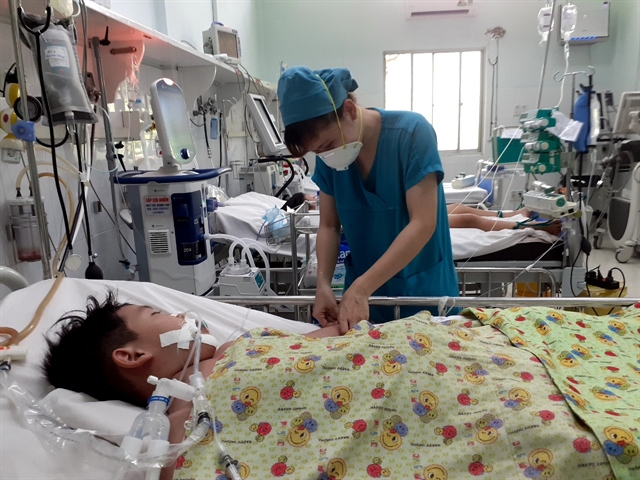 Society
Society

 |
A child patient hospitalised in HCM City with dengue fever. HCM City is bracing itself for both COVID and dengue fever outbreaks while lacking medicines and healthcare workers. — Photo baotintuc.vn
HCM CITY — HCM City is facing three major medical problems, its top healthcare official has said: having to ward off COVID and dengue fever simultaneously, shortage of medicines and equipment and shortage of public medical staff.
Tăng Chí Thượng, director of the Department of Health, said the HCM City Pasteur Institute had found two cases of the new BA.4 subvariant of COVID in Thủ Đức City and one of BA.5 in Củ Chi District by sampling.
The daily caseload had been rising slightly in the past three weeks, sometimes reaching over 50, while there only used to be fewer than 30 a few months ago.
But the number of intensive and hospitalised cases remained stable.
The new subvariants of Omicron were spreading around the world, so Việt Nam needed to watch out for the possibility of another outbreak.
HCM City and other southern provinces were facing a serious dengue fever problem due to humid weather and resumption of travel.
The city had recorded nearly 22,000 cases of dengue since the start of this year, a 184 per cent increase year-on-year.
There had been 11 deaths, including of pregnant women and other adults and children.
The city was also running out of some rare medicines that had been temporarily discontinued in other countries, and imports of some others were hindered by the ongoing Russia – Ukraine conflict, such as Belarussian chemotherapy agent Methotrexat.
Purchases of certain medicines had also been tardy due to delays in bidding and negotiations.
The city needed to ensure sufficient supply of medicines and medical equipment, and it was unacceptable that medicines for treating common illnesses were lacking.
Another major problem was the quitting of public medical workers in droves after the fourth COVID wave last year: More than 9,000 had left in the past 18 months.
In HCM City, 2,028 medical staff had quit since early 2021, equivalent to 5 per cent of the city's medical workforce.
Many had resigned due to the stress caused by the last COVID outbreak and low salaries.
HCM City would push for higher third and fourth COVID vaccination rates by raising awareness of its benefits and organising mobile vaccination centres for people vulnerable to the disease.
It would also focus on eliminating mosquitos to prevent dengue.
The department had sought permission to establish an organisation to buy medicines and medical equipment for public hospitals and asked for more funds for buying and stocking up on rare medicines.
As for the personnel shortages, the city would adopt policies to attract and retain medical workers, and expand its network of community health workers.
Community health workers played a big role in the city’s fight against COVID by raising awareness of preventive measures in their communities and helping local authorities keep track of COVID risks.
They included retired doctors and academics who attended COVID hotlines. — VNS




